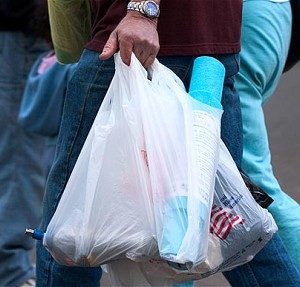Another week, another bag ban.
City after city has taken action against the humble plastic shopping bag. So far, the campaigns have stopped there. The state of New York is thinking bigger though. Governor Andrew Cuomo (D) says that his new 2019 budget will include new steps to protect the environment, including a ban on single-use shopping bags. Cuomo’s proposal would make New York only the second state to ban plastic bags outright (California was the first). His plan would also increase the deposit on plastic bottles to further encourage recycling.
This isn’t the first time that New York has considered the proposal. In April, Cuomo first introduced the current plastic bag ban. At the time, he encountered resistance in the state Senate, which was then controlled by Republicans. After November’s elections, Democrats now have a comfortable majority in both houses, making passage more likely.
For Cuomo, state regulation is seemingly just as important as environmental protection. In March 2017, he blocked a proposal to charge a five cent fee for plastic bags within New York City, arguing that it made more sense of regulate the issue on the state level. Instead, Cuomo created a task force to study the issue.
According to the report issued by the task force, though New Yorkers use a lot of plastic bags, no one really knows how many of them are reused or recycled. After looking at information from five unnamed major retailers, the study noted that store takeback programs were “only shown to achieve a 5% reduction in the use of single-use plastic bags.” The New York City Department of Sanitation estimates it spends $12.5 million a year to handle about 73,000 tons of plastic bags.
The statistics are tricky, though, since there is no central authority that knows how many plastic bags New Yorkers use in a year. In the same way, traditional recycling statistics, which focus on tonnage, don’t account for the many informal uses of plastic bags. One commonly-cited study by Apco found that 90 percent of surveyed consumers reused their plastic shopping bags as trash can liners, lunch bags, trash disposal, and for pet waste, undercutting their depiction as “single-use.”
Cuomo and his allies would have shoppers switch to either reusable shopping bags or paper. Each of these potential solutions poses problems of its own. Paper bags are heavier and bulkier and cost more to ship, raising both shipping costs and carbon emissions. Since they cost retailers three to five times more than plastic bags, even New York’s own study concludes that cost increases would likely be passed along to customers.
Instead of switching to paper, some retailers instead switch to heavier versions of single-use bags, defeating the goal of the ban.
“In many areas, bans include bags that are less than a certain thickness…” the commission reported. “Retailers end up purchasing plastic bags that are over the minimum thickness that qualify as reusable and hand them out at checkout for free. In these cases, there is not an actual reduction in single-use plastic bag use and the increased thickness of the bag can result in the same or potentially increased amount by weight of plastic.”
Even if fully enforced, plastic bag bans have had limited effects. Because of their light weight, plastic shopping bags are cheap to manufacture, ship, and store. Reusable bags, researchers have found, have a larger carbon footprint than plastic bags and take more water and energy to manufacture.
According to a study from Clemson University on the environmental impact of single-use plastic shopping bags, a reusable shopping bag had to be taken on as many as 34 shopping trips to equal the environmental impact of one plastic bag that was subsequently reused. Meanwhile, most shoppers used a reusable bag only three times before discarding it–which wasn’t enough to overcome the greater environmental impact of its manufacture and shipment.
The three r’s of the environmentalist movement used to be reduce, reuse, and recycle. When it comes to plastic bag bans, a focus on reducing plastic use has obscured the many benefits of reusing them.

